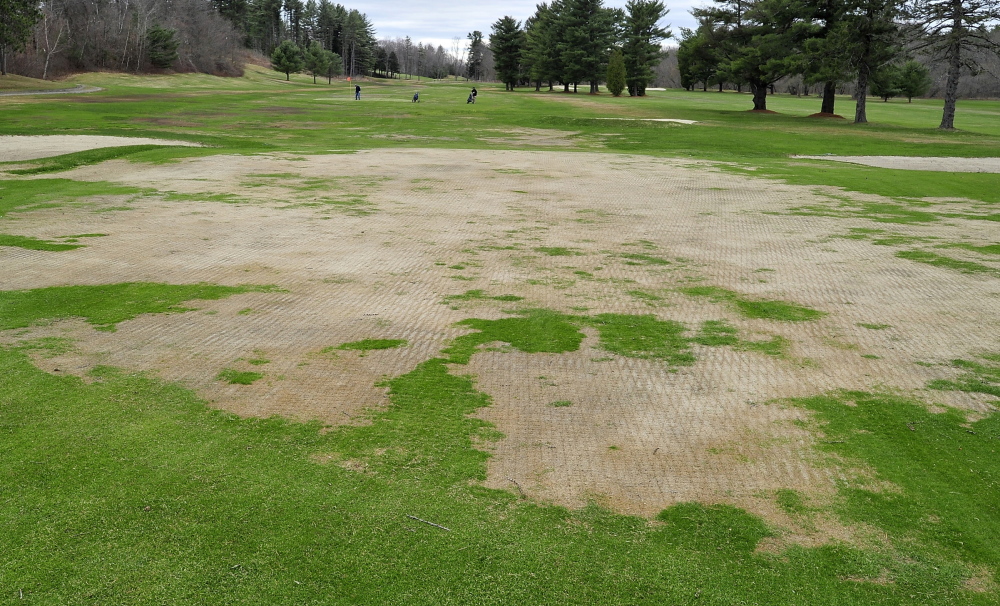Randy Hodsdon, who has been playing golf in Maine for four decades, can’t remember a spring when courses all over the state were in such poor condition.
“I’ve never seen so much widespread damage,” said Hodsdon, director of rules and competition for the Maine State Golf Association.
The harsh winter has taken a toll on more than just the golfers eagerly waiting to play again. It has caused significant damage to golf courses, which have lost income and had to make costly repairs.
Periods of freezing and thawing this winter caused ice damage to grass, most notably on the greens. In golf parlance it’s called winter kill, and it has forced local courses to carve out temporary greens on fairways to allow the regular greens to recover.
“Even turf that is dormant is still respirating and feeding itself,” said Ed Michaud, golf superintendent/part owner at Fox Ridge Golf Club in Auburn. “The ice forms such a tight seal, the grass can’t breathe and it suffocates.”
Riverside Golf Course in Portland has 11 temporary greens on its North course. The Purpoodock Club in Cape Elizabeth has six temporary greens. Portland Country Club in Falmouth has resodded its 14th green because of severe winter kill, and has canceled a Maine golf association midweek amateur tournament that was scheduled for May 6.
The problem also extends south. The Manchester Country Club in Bedford, N.H., has temporary greens. And the Salem Country Club in Massachusetts is expected to open late.
In South Portland, the Sable Oaks course won’t open for another two weeks. Val Halla Golf & Recreation Center in Cumberland will open Friday.
“It’s frustrating,” said Matt Greenleaf of Portland, one of the state’s top golfers. “Maine has a short golf season to begin with. It’s tough to get your confidence putting when there’s so many different types of greens.”
A study by the University of Maine’s School of Economics found that the state’s golf industry generated $269.5 million in revenue in 2011, the most recent year for which data was available. It also accounted for 4,935 full- or part-time jobs producing $90.4 million in income.
With the season starting slowly, those figures could take a hit in 2014.
“We’ve lost a month of the season,” said Dick Browne, whose family owns Natanis Golf Course, a 36-hole layout in Vassalboro. Browne estimates the late start has cost Natanis $10,000 to $15,000 in lost greens fees.
“That amount you can’t get back,” he said.
Ryan Scott, general manager of Riverside, said the municipal course opened 12 days later than last year. That’s a loss of $12,000 in greens fees from a year ago, he said.
Golf course superintendents say they have had to spend more money than usual on grass seed. They’re already doing greens maintenance that typically doesn’t start until mid-May, such as overseeding and aeration to jump-start the growth of the grass.
“I’ve spent three times the amount I usually spend on seed,” said Toby Young, superintendent at Val Halla and president of the Maine Golf Course Superintendents Association.
Young normally pays $1,000 for seed per season. That tab has grown to $3,000 this year, he said.
Some superintendents use covers to warm the greens at night during the winter. Waterville Country Club spent $20,000 for six of the covers. This spring, some superintendents are using the covers to warm the greens to aid grass growth.
“(Course) superintendents do the best they can, but if Mother Nature doesn’t cooperate, there’s not much you can do,” said Waterville head pro Don Roberts.
Tough winters in the past have affected some courses more than others. This year, it appears no area was spared.
Not all courses have resorted to temporary greens, but damage is so widespread that some in the industry are already calling it unprecedented, even though the extent of it statewide isn’t yet known. Courses in northern Maine won’t open for a while, and those in the mountains, such as Sugarloaf in Carrabasset Valley and Sunday River in Newry, still have significant snow cover.
Hodsdon, who was a golf pro before working for the state golf association, said other New England states and parts of New York state have been affected as well.
“There’s definitely a line in the middle of Massachusetts where they and everything north of it got hit,” said Hodsdon. “The courses in southeastern Massachusetts and in Rhode Island along the coast never got touched. I was at a meeting at TPC Boston (in Norton, Mass., a little south of Boston) and the course looked like Augusta National at the Masters.”
The Maine State Golf Association normally hosts weekly amateur tournaments from mid-April to mid-November. The first is usually at Biddeford-Saco Country Club, known for its good drainage. The tournament had been scheduled for April 18-19.
“The course called us and canceled,” said Hodsdon. “They had five temporary greens.”
This is the first time the opening tournament couldn’t be played at Biddeford-Saco, said Nancy Storey, executive director of the golf association. Last weekend, the weekly association tournament at Fox Ridge in Auburn did take place. The course had significant winter kill damage, but all the greens were open.
“We’ve got a fair amount of damage, but I think everyone does,” said Michaud, the part-owner of Fox Ridge. “This is the first time in the 13 years the course has been opened that this has happened.”
Greenleaf, who works at Golf and Ski Warehouse in Scarborough, has noticed something else. There aren’t as many people buying golf balls.
“People are still excited about the new equipment,” he said, “but the sale of golf balls is down. They’re not playing as much so they aren’t losing as many balls.”
Tom Chard can be contacted at 791-6419 or at:
tchard@pressherald.com
Twitter: TomChardPPH
Send questions/comments to the editors.




Success. Please wait for the page to reload. If the page does not reload within 5 seconds, please refresh the page.
Enter your email and password to access comments.
Hi, to comment on stories you must . This profile is in addition to your subscription and website login.
Already have a commenting profile? .
Invalid username/password.
Please check your email to confirm and complete your registration.
Only subscribers are eligible to post comments. Please subscribe or login first for digital access. Here’s why.
Use the form below to reset your password. When you've submitted your account email, we will send an email with a reset code.